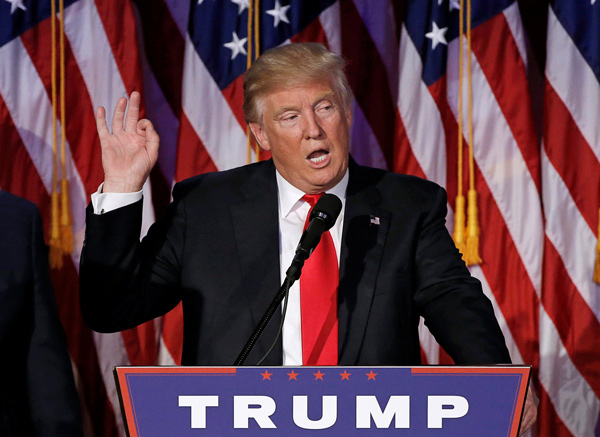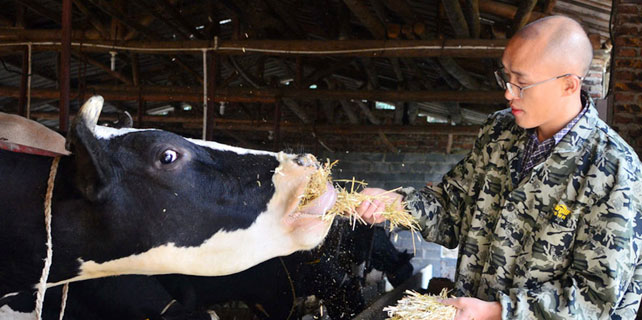US: No change in China policy




 |
|
US President-elect Donald Trump speaks at election night rally in Manhattan, New York, US, November 9, 2016. [Photo/Agencies] |
President Barack Obama's administration reaffirmed the US' one-China policy on Monday in the wake of president-elect Donald Trump's phone call with Taiwan leader Tsai Ing-wen last Friday.
After taking much heat from China and many foreign policy experts in the US, Trump tweeted on Sunday: "Did China ask us if it was OK to devalue their currency (making it hard for our companies to compete), heavily tax our products going into their country (the US doesn't tax them) or to build a massive military complex in the middle of the South China Sea? I don't think so!"
Asked if there is any change of impression regarding Trump following the phone call and his latest tweets, Chinese Foreign Ministry spokesman Lu Kang said in Beijing on Monday: "We never comment on other countries' politicians and their personalities. We focus on their policies, especially policies toward China."
White House Press Secretary Josh Earnest reiterated on Monday that the US is committed to the one-China policy, saying it is a policy that's been in place for almost 40 years and a policy that is aimed at promoting peace and stability across the Taiwan Straits.
Earnest would not comment on the possible strategy pursued by the next administration. "I am not sure how that benefits the United States. I'm not sure how that benefits the United States relationship with Taiwan. I am not sure how that benefits the Taiwanese people. I am not sure how that benefits the US relationship with China," he said of Trump's latest behavior.
State Department deputy spokesman Mark Toner made similar comments on Monday at the daily briefing. He credited stable and peaceful cross-Straits relations since 1979 to the fact the US has been pursuing the one-China policy.
"That has not changed previous to or since the phone call by the president-elect," he said.
"It's only through consistency and implementing this policy, standing by this policy, you have, I said, stable cross-strait relations," he added.
US vice-president-elect Mike Pence on Sunday downplayed the conversation with Tsai, saying it was a "courtesy" call and not intended to show a shift in US policy on China, according to foreign media reports.
- Some lessons in diplomacy would benefit Trump
- Wait-and-see approach urged on ties after Trump's Twitter remarks
- No need to over-interpret Trump's phone call with Tsai
- Trump talk with Tsai sparks row
- Top think tank head untroubled by Trump
- China lodges complaint to US over Trump's call with Taiwan leader


















